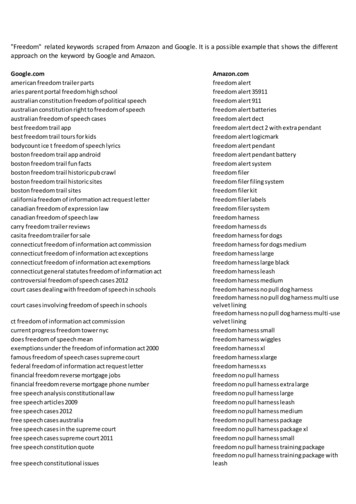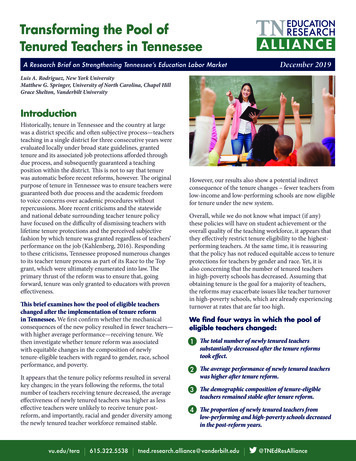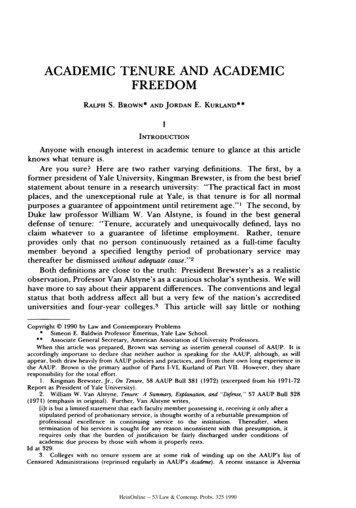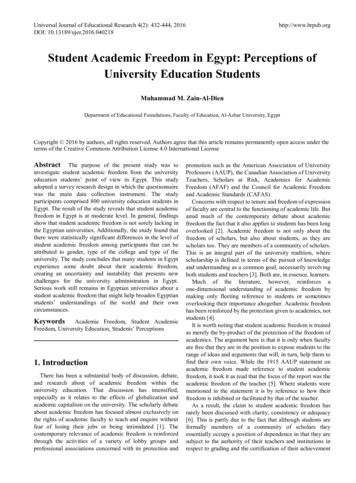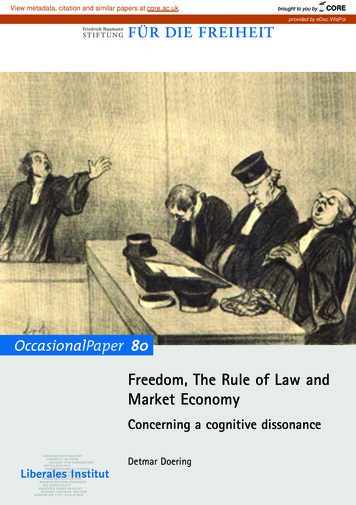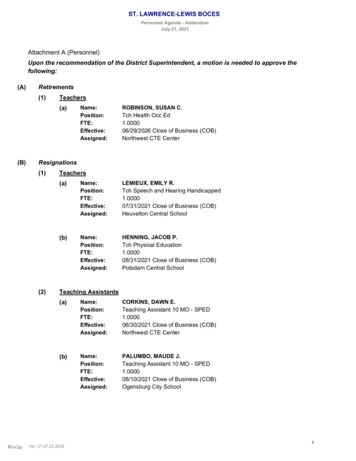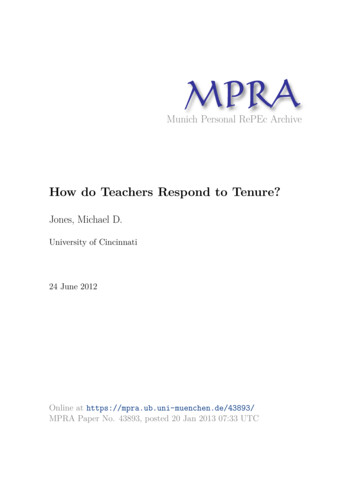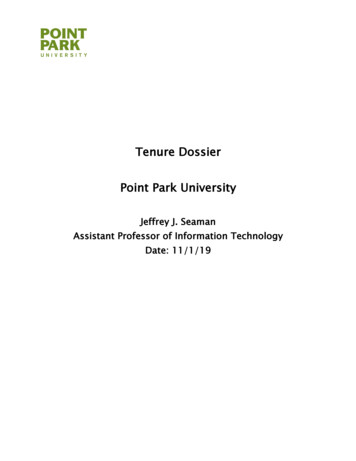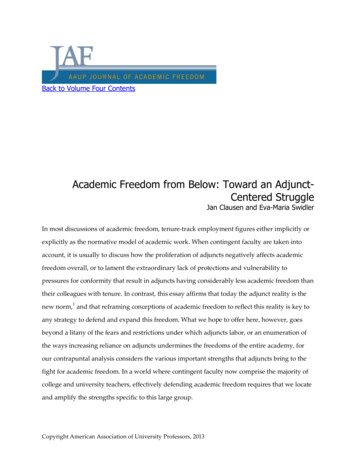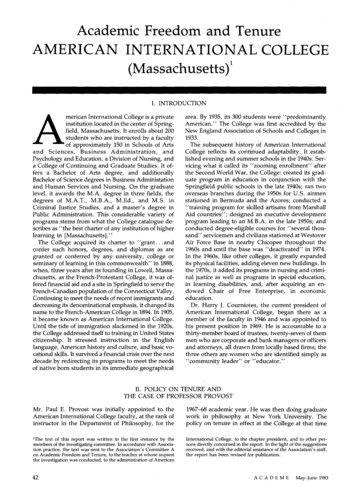
Transcription
Academic Freedom and TenureAMERICAN INTERNATIONAL COLLEGE(Massachusetts)1I. INTRODUCTIONAmerican International College is a privateinstitution located in the center of Springfield, Massachusetts. It enrolls about 200students who are instructed by a facultyof approximately 150 in Schools of Artsand Sciences, Business Administration, andPsychology and Education, a Division of Nursing, anda College of Continuing and Graduate Studies. It offers a Bachelor of Arts degree, and additionallyBachelor of Science degrees in Business Administationand Human Services and Nursing. On the graduatelevel, it awards the M.A. degree in three fields, thedegrees of M.A.T., M.B.A., M.Ed., and M.S. inCriminal Justice Studies, and a master's degree inPublic Administration. This considerable variety ofprograms stems from what the College catalogue describes as "the best charter of any institution of higherlearning in [Massachusetts]."The College acquired its charter to "grant. andconfer such honors, degrees, and diplomas as aregranted or conferred by any university, college orseminary of learning in this commonwealth" in 1888,when, three years after its founding in Lowell, Massachusetts, as the French-Protestant College, it was offered financial aid and a site in Springfield to serve theFrench-Canadian population of the Connecticut Valley.Continuing to meet the needs of recent immigrants anddecreasing its denominational emphasis, it changed itsname to the French-American College in 1894. In 1905,it became known as American International College.Until the tide of immigration slackened in the 1920s,the College addressed itself to training in United Statescitizenship. It stressed instruction in the Englishlanguage, American history and culture, and basic vocational skills. It survived a financial crisis over the nextdecade by redirecting its programs to meet the needsof native born students in its immediate geographicalarea. By 1935, its 300 students were "predominantlyAmerican." The College was first accredited by theNew England Association of Schools and Colleges in1933.The subsequent history of American InternationalCollege reflects its continued adaptability. It established evening and summer schools in the 1940s. Servicing what it called its "zooming enrollment" afterthe Second World War, the College: created its graduate program in education in conjunction with theSpringfield public schools in the late 1940s; ran twooverseas branches during the 1950s for U.S. airmenstationed in Bermuda and the Azores; conducted a"training program for skilled artisans from MarshallAid countries"; designed an executive developmentprogram leading to an M.B.A. in the late 1950s; andconducted degree-eligible courses for "several thousand" servicemen and civilians stationed at WestoverAir Force Base in nearby Chicopee throughout the1960s and until the base was "deactivated" in 1974.In the 1960s, like other colleges, it greatly expandedits physical facilities, adding eleven new buildings. Inthe 1970s, it added its programs in nursing and criminal justice as well as programs in special education,in learning disabilities, and, after acquiring an endowed Chair of Free Enterprise, in economiceducation.Dr. Harry J. Courniotes, the current president ofAmerican International College, began there as amember of the faculty in 1946 and was appointed tohis present position in 1969. He is accountable to athirty-member board of trustees, twenty-seven of themmen who are corporate and bank managers or officersand attorneys, all drawn from locally based firms; thethree others are women who are identified simply as"community leader" or "educator."II. POLICY ON TENURE ANDTHE CASE OF PROFESSOR PROVOSTMr. Paul E. Provost was initially appointed to theAmerican International College faculty, at the rank ofinstructor in the Department of Philosophy, for the1967-68 academic year. He was then doing graduatework in philosophy at New York University. Thepolicy on tenure in effect at the College at that timexInternational College, to the chapter president, and to other persons directly concerned in the report. In the light of the suggestionsreceived, and with the editorial assistance of the Association's staff,the report has been revised for publication.The text of this report was written in the first instance by themembers of the investigating committee. In accordance with Association practice, the text was sent to the Association's Committee Aon Academic Freedom and Tenure, to the teacher at whose requestthe investigation was conducted, to the administration of American42ACADEMEMay-June 1983
provided for continuous tenure for faculty membersholding professorial ranks upon reappointment following a probationary period: four years for professors;five years for associate professors; and six years forassistant professors. In 1971, at the end of his fourthyear of service, Mr. Provost was promoted to the rankof assistant professor and reappointed for a two-yearterm. President Courniotes, in notifying him of thepromotion, referred to his lack of a master's degree (hehad embarked on a doctoral program without it) andto his consequent inability to be continued at the College should he complete his probationary periodwithout having completed the requirements for thedoctorate and with nothing more than a bachelor'sdegree.Through Professor Provost's first four or five yearsof service at American International College, tenureseems to have been granted to faculty members routinely upon the completion of their probationaryperiods. By 1972, however, student enrollment was nolonger increasing and the size of the faculty was nolonger expanding. President Courniotes wrote onSeptember 28, 1972, to eight members of the faculty,including Professor Provost, who were approachingthe end of their probationary service. He stated thatvirtually the entire current faculty would have tenurein another three years under existing policies andtrends, according to projections, unless those becoming eligible for tenure were not retained. He informedthem that the tenure system at the College was beingreviewed to decide whether it should be eliminated ormodified. He invited the eight faculty members "towaive any and all tenure rights under the presenttenure provisions," in return for which all except Professor Provost would receive two-year contracts withno reduction in rank or salary and with notification byOctober 1 of the second year if the contract was notrenewed.Professor Provost was offered only a one-year contract because he lacked the master's degree. He hadby then accumulated seventy-two course creditstowards his doctorate, had passed his language requirements and comprehensive examinations, and hadstarted work on his dissertation. The following year,New York University changed its position on awardinga master's degree to doctoral candidates and the degreewas granted to Professor Provost. His lack of the degree until the 1973-74 academic year was not an issuein the events that followed.The eight faculty members met among themselves,with President Courniotes, and with a local attorney.According to what some of them later said to theundersigned ad hoc investigating committee, theybecame convinced that the president would denytenure to some among them and release them if theyresisted the waiver. The attorney advised them thatthey had little legal recourse. They all signed thewaiver. Within a few years, six of the eight facultymembers were granted tenure, one was releasedfollowing a severe decline in enrollments in his department, and Professor Provost, as will be explained, wasserving annually on a "terminal" contract.New tenure regulations for American InternationalACADEMEMay-June 1983College, with an extremely complex "Schedule forDecisions Concerning Tenure (with implications)" andan accompanying "place value lexical," were approvedby the faculty on March 1, 1974, and became effectiveon September 1 of that year. The regulations state thata decision to extend an appointment beyond the ninthyear of service, if neither tenure nor the issuance ofa one-year "terminal" contract (as opposed to a multiyear renewable contract) has resulted by then, "willbe a decision to grant tenure to the faculty memberwhen a tenured position in his department becomesavailable. The determination of the availability oftenured positions is the sole responsibility of the administration." With respect to a "terminal" contract,the regulations state that although it "should be considered to be terminal, the administration reserves theprerogative to grant an extension of this or any subsequent contract." Accordingly, either through lack ofan available tenured position as determined by the administration or through being placed on "terminal"status, a faculty member at the College can be retainedindefinitely on term appointment at the administration's pleasure. The regulations specified that the service of Professor Provost, because he had signed awaiver of his tenure rights under the previous policyand because he had not been granted tenure or reappointed with a multiyear contract, would henceforthbe terminal at the discretion of the administration.Each year through 1979, Professor Provost wasoffered a one-year "terminal" contract which, until1979, was annually renewed. On December 7, 1979,President Courniotes wrote to inform Professor Provost that he would not be offered a contract for thenext academic year and that his affiliation with the College would end on July 31, 1980. Professor Provost thusreceived eight months of notice that his thirteenth yearof continuous service to American International College would be his final year. His last seven contractsat the College had been "terminal."Some months prior to the commencement of whatproved to be Professor Provost's final year on thefaculty, the local AAUP chapter at American International College had petitioned the National Labor Relations Board for certification as the faculty's exclusiverepresentative for purposes of collective bargaining. Ahearing on the petition was held by the board'sregional office in Boston in April and May, 1979, withthe College administration objecting to certification ongrounds, like those asserted in the case of YeshivaUniversity, that the members of the faculty were essentially managerial. Even before the U.S. Supreme Courtissued its decision on Yeshiva University in February,1980, the board's regional office director referred thecase of American International College to the board inWashington. At this writing, the case still remainsundecided.Professor Provost had played an active role in theAAUP chapter's presentation at the hearing on certification. When he received notice the followingDecember that his current appointment would indeedbe terminal—a notice against which he had no avenueof appeal within the College—the chapter in his behalfpromptly filed a charge against the College administra43
tion of unfair labor practice, asserting that the actionto terminate his services was violative of his rightsunder the National Labor Relations Act. In January,1980, an investigator from the board's regional officevisited the College for two days in connection with thisand other charges. On February 8, the board's regionaldirector found Professor Provost's charge justified andissued a complaint against the administration and anotice of hearing before an administrative law judgeon July 15, 1980. The hearing was postponed at therequest of counsel for the administration first untilNovember and then, at the administration's further request, rescheduled until such time as the primary caseover certification has been decided by the NationalLabor Relations Board. The complaint against theadministration of an unfair labor practice in ProfessorProvost's case thus remains open and unheard.Professor Provost also sought assistance from theAmerican Association of University Professors. TheAssociation's staff wrote to President Courniotes onJanuary 31, 1980, setting forth its concern that the administration's action to terminate Professor Provost'sservices, taken long after those services had exceededthe seven years of probation permitted under the 1940Statement of Principles on Academic Freedom and Tenureand unaccompanied by a statement of specific causeand opportunity for a hearing, appeared to deny Professor Provost his rights under the 1940 Statement ofPrinciples. President Courniotes's reply, sent on March12, was brief. He acknowledged the January 31 letterand went on to say that "in view of the fact that thereis a complaint before the NLRB, which is in the process of adjudication, regarding Professor Provost, I donot believe it is appropriate to comment at this time."Subsequent letters sent by the staff to PresidentCourniotes, in April and in October, 1980, wentunanswered. After several additional months, duringwhich awaited actions by the National Labor RelationsBoard did not materialize, the Association's generalsecretary authorized an investigation, and PresidentCourniotes was so notified by letter of July 21, 1981.The undersigned ad hoc investigating committee wasappointed, and its names were transmitted to President Courniotes on August 12. Six days later, the president telephoned the member of the staff who had beenwriting to him. He requested that the Association"disinvite" the investigating committee because hehad been advised by counsel not to meet with the committee while the charge against the administration ofunfair labor practice was pending.With the administration unwilling to cooperate, theinvestigating committee relied on the president of theAAUP chapter, Professor Lawrence Habermehl, forarrangements for interviews. The committee, afterexamining the available documentation, made threeday-long visits to American International College onNovember 6, 13, and 30, 1981. No member of the administration accepted an invitation to meet with thecommittee. Meetings were held, however, with Professor Provost, with four now-tenured faculty members who signed the 1972 waiver of tenure rights, witha member of the Faculty Steering Committee (the bodyresponsible for, among other things, the processing offaculty grievances), with the secretary of the facultyduring the period of transition from 1972 to 1974 andthe adoption of the current tenure regulations, withthe professor of mathematics who designed the "lexical" that tracks faculty appointments under the regulations, with the retired chairman of the Departmentof Philosophy who had initially recruited ProfessorProvost, and with Professor Habermehl, who ispresently chairman of the department and its solemember. Although the faculty members who met withthe committee were courteous and communicative, anumber of interviews that had been arranged werecancelled, rescheduled, and cancelled again. The committee found that it was unable to speak with facultymembers who were generally sympathetic with the administration's action until late in the day of its thirdand final visit, just as the committee was about to giveup hope of any such contact.III. ISSUESA. Safeguards of Tenure and the Action AgainstProfessor ProvostThe 1940 Statement of Principles on Academic Freedomand Tenure provides for continuous tenure after a probationary period that should not exceed seven years.Termination of tenure, except for retirement for ageor under extraordinary circumstances because of financial exigency, can occur under the 1940 Statement ofPrinciples only for adequate cause, with opportunityfor a hearing before a faculty committee and with affordance of other safeguards of academic due process.Professor Provost was in his thirteenth year of service when the administration notified him that hewould not be retained beyond that year. As to causefor the action, President Courniotes's notification ofDecember 7, 1979, stated simply that it was issued with44the concurrence of all of the academic administratorsand that the decision was "part of our overall and continuing evaluation of personnel not on tenure and ourreview of all other pertinent factors concerning the College's teaching personnel requirements." ProfessorProvost requested a more specific explanation. President Courniotes, replying on December 21, stated that"in accordance with the Faculty Handbook, your contract is understood to be a terminal one, and there wereno compelling reasons for the administration to renewit." He stated further that the administration, in itsreview of the contracts of all nontenured facultymembers, considered three questions: the overallneeds of the particular department; the comparativeneeds of other departments; and how, if a search fora new person were conducted, the qualifications of thecurrent faculty would compare with those of othersACADEMEMay-June 1983
who were available. "When the administrationevaluated the answers to these questions in your particular case," President Courniotes stated to ProfessorProvost, "the answers were such as to result in thedecision not to renew your contract." This was all thatProfessor Provost received from the administration byway of reasons for its decision not to retain him, andhe had no opportunity for a hearing at American International College. The notice that he received wasinadequate by several months when measured againstthe year of notice that the 1940 Statement of Principlesprovides.The investigating committee appreciates that Professor Provost signed a waiver, written into each of hisseven "terminal" contracts, of tenure rights such asthose noted above. While the regulations of AmericanInternational College may allow such a waiver,however, the 1940 Statement of Principles does not. Itaffords the rights of tenure to all full-time facultymembers who are retained beyond the maximumperiod of probation. Moreover, Professor Provost'scase was not one in which he sought out continuedservice without tenure because he anticipated that animpending evaluation of his qualifications for tenurewould go against him on the merits. Rather, the College administration in 1972 went to him and to allothers who were approaching the time for a decisionon tenure, indicated to them that if they were candidates for tenure some might be denied it because toomany of the current faculty were obtaining tenure, andinvited them to avoid taking an immediate risk by signing a waiver of tenure rights in return for a period ofassured further appointment while a new tenure policywas being formulated. The investigating committee rejects the proposition that Professor Provost, in signing the waiver together with the seven others as it wasput to them by the administration, divorced himselffor the next year and all the years that followed fromthe rights of tenure that prevail in the academicprofession.The investigating committee finds that the American International College administration acted in viola-What constitutes protected conduct in labor organizing under the National Labor Relations Act may wellinvolve considerations that are distinct from conductprotected by academic freedom under the 1940 Statement of Principles. Still, the investigating committeedoes not doubt that a professor who speaks out publicly in behalf of collective bargaining for faculty membersat his institution is engaging in protected conductunder principles of academic freedom and that a serious issue of academic freedom is raised by ProfessorProvost's allegation.The investigating committee, in examining this issue,notes that the administration retained Professor Provost year after year and dismissed him only after hebecame active in attempting to establish a facultyunion. It notes also that the regional director of the National Labor Relations Board, after a preliminary investigation, found Professor Provost's allegation sufficiently justified so that he issued a complaint againstthe administration. The committee notes, on the otherhand, that no hearing has been held on that complaint.It notes also that the administration did not replaceProfessor Provost in the Department of Philosophy,which is staffed now solely by Professor Habermehl,and that this suggests, as did President Courniotes'svery general letter of explanation to Professor Provost,that the president's action was motivated at least inpart by a wish to reduce the size of the department.The investigating committee discussed ProfessorProvost's allegation with him and with other facultymembers, but it was unable to discuss it with President Courniotes or with other administrative officerswho supported the president's action. The administration had declined to meet with the committee ongrounds that the complaint against it of unfair laborpractice in Professor Provost's case was under adjudication, and the committee can appreciate the administration's reluctance to talk with a committee of theAssociation about its reasons for acting against Professor Provost while a charge filed by the Association'slocal chapter with the National Labor Relations Boardon this very matter remained unresolved. Conceivably,if the administration had been generally interested intion of the 1940 Statement of Principles on AcademicFreedom and Tenure by dismissing Professor Provost at cooperating with the Association's investigation, conditions for discussion could have been arranged thatthe end of his thirteenth year of service without statingwould have safeguarded the administration from anyspecific cause for its action and without affording himresulting damage to its position in the case before thethe opportunity for a hearing and other protections oflabor board. In any event, the administration wouldacademic due process.not discuss the case with the investigating committee,and without having had the opportunity for that disB. Professor Provost's Union Activitiescussion the committee cannot reach a determinationas to whether the action against Professor Provost wasAs was stated earlier, Professor Provost has allegedbasedsignificantly on considerations violative of histhat his activities to gain representation rights for theacademicfreedom.AAUP chapter for purposes of collective bargainingconstituted the basis for the administration's decisionA suspicion of violation of academic freedom nonenot to renew his "terminal" contract for the 1979-80theless lingers, in the investigating committee's judgacademic year as it had renewed his six previous "terment, a suspicion which would not have arisen hadminal" contracts, and the AAUP chapter filed a chargethe administration afforded Professor Provost the proof unfair labor practice on this matter which as of thistections of academic due process. A hearing on statedwriting still remains unadjudicated by the Nationalcharges, as called for by the 1940 Statement of Principles,Labor Relations Board and may never be adjudicatedwould have allowed Professor Provost to pursue theif the prior issue of certification is not resolved in theacademic freedom issue in presenting his defense. Prochapter's favor.fessor Provost was, of course, not recognized at Ameri-ACADEMEMay-June 198345
can International College as having attained tenure,but nontenured faculty members are entitled under theAssociations's Statement on Procedural Standards in theRenewal or Nonrenewal of Faculty Appointments to thereasons for a decision against reappointment and toa hearing if they allege that the reasons were basedon factors violative of their academic freedom. Professor Provost, however, in his longtime status atAmerican International College as a "terminal" appointee, was denied any such procedural protections.As a result, the issue of whether or not the Collegeadministration violated his academic freedom has beenallowed to remain open to speculation.C. The College Regulations and Conditions forAcademic Freedom and TenureAmerican International College, in the preamble tothe tenure regulations that it adopted in 1974, holdsthat the regulations "do not compromise the traditionof tenure which the profession has, largely through theefforts of the AAUP, developed over the years." Theinvestigating committee believes that those at the College who made this assertion are greatly mistaken.Prominent in the regulations is the highly complex"Schedule for Decisions Concerning Tenure (withimplications)" that says little about qualitative decisions, emphasizes that affirmative decisions are the administration's prerogative, and concentrates on lengthsof contracts, dates of notice, and how many monthsof "guaranteed job security" each decision on renewalor nonrenewal will bring. The regulations allow nineyears for a decision on whether a faculty member qualifies for tenure, and they allow for indefinite servicewithout tenure after that time until the administrationmay decide, a determination which is its "sole responsibility," that a tenured position has become available.They allow, as has been seen in Professor Provost'scase, for a paradoxically unlimited "terminal" appointment which, once initiated, can continue through theyears at the administration's pleasure with no furtherentitlement to evaluations, reasons for eventual termination, or opportunity for review.The investigating committee regrets that membersof the faculty of American International College joinedin formulating these arrangements and voted to adoptthem. Whatever may have been their sense of insecurity, their action reflects a purchase of a limited amountof job security at the price of surrendering the longrange professional protections inherent in the 1940Statement of Principles on Academic Freedom and Tenureand derivative Association standards for academic dueprocess. It is the investigating committee's judgmentthat under the current tenure regulations academicfreedom at American International College cannot beassured.22The Association has long maintained that inadequate protectionsfor principles of academic freedom and tenure are no more acceptable if adopted by action of the faculty than by that of the administration. See "Academic Freedom and Tenure: Smith College," AAUPBulletin, Spring 1946, pp. 146, 147.IV. CONCLUSIONSCommittee A on Academic Freedom and Tenure has by vote1. The administration of American International College acted in violation of the 1940 Statement of Principles authorized publication of this report in Academe: Bulletin ofon Academic Freedom and Tenure in the case of Professorthe AAUP.Paul E. Provost by dismissing him after thirteen yearsof service without setting forth specific cause for itsaction and without offering him a hearing and othersafeguards of academic due process.2. The validity of Professor Provost's allegation thathe was dismissed because of his activities in behalf ofa faculty union, and thus the possibility that hisacademic freedom was violated by the American International College administration, has been permitted by the administration, in not allowing for a hearing on the matter, to remain open to speculation.3. The current tenure regulations of American International College, by allowing indefinite faculty servicewithout the protections of tenure and in some cases'without even minimal procedural safeguards, leaveacademic freedom at the College unassured.MATTHEW W. FINKIN(Law), Southern Methodist University,chairmanMEMBERS: BERTRAM H. DAVIS (English), Florida State University; ROBERT A. GORMAN (Law), University of Pennsylvania;MARY W. GRAY (Mathematics), American University; WALTERP. METZGER (History), Columbia University; JACK L. NELSON(Education), Rutgers University; THOMAS M. SCANLON, JR.(Philosophy), Princeton University; JUDITH J. THOMSON(Philosophy), Massachusetts Institute of Technology;WILLIAM W. VAN ALSTYNE (Law), Duke University; JORDANE. KURLAND (History and Russian), Washington Office, exofficio; IRVING J. SPITZBERG, JR. (Education and Policy Studies),Washington Office, ex officio; VICTOR J. STONE (Law), University of Illinois, ex officio; RALPH S. BROWN (Law), Yale Univer-sity, Consultant; CLARK BYSE (Law), Harvard University, Con-sultant; PETER O. STEINER (Law), University of Michigan, Consultant; CAROL SIMPSON STERN (Interpretation), NorthwesternUniversity, Consultant.STANLEY J. YOUNG (Management),University of Massachusetts,Amherst, chairmanR. KAUFMAN (English)Mount Holyoke CollegeMARJORIEInvestigating Committee46ACADEMEMay-June 1983
DevelopmentsRelating to Censure by the AssociationMembers of the Association's staff, acting on behalf of Committee A onAcademic Freedom and Tenure, communicate during the course of eachyear with administrations under censure. The staffoffers its assistance and that of Committee A inbringing about developments at the institutionwhich would enable the committee to recommendto the annual meeting that the censure be removed. A summary of developments at institutionson the list of censured administrations appears annually in the issue of Academe (prior to 1979, theAAUP Bulletin) that immediately precedes the annual meeting.The statements that follow, in chronologicalorder according to the date of imposition of censure, constitute my appraisal of developments att:he listed institutions for the year preceding April1-3, 1983. Relevant actions of significance whichoccur after April 15 will be reported to CommitteeA;; the council, and the annual meeting at the sessions of these bodies in Washington, D.C., on June13-18, 1983.The list of censured administrations, appearingelsewhere in this issue, cites the published reportsthat, were the basis for the censure in each case.JORDAN E. KURLANDAssociate General SecretarySouth Dakota State Colleges and Universities under SouthDakota Board of Regents1The forty-eighth annual meeting in 1962 directed censureagainst the Board of Regents of Education of the State ofSouth Dakota. The censure followed an investigating committee's report on the regents' dimissal, without the protections of academic due process, of a professor who had beenon the South Dakota State Uni
on Academic Freedom and Tenure, to the teacher at whose request the investigation was conducted, to the administration of American 1967-68 academic year. He was then doing graduate work in philosophy at New York University. The policy on tenure in effect at the College at that time International College , to chapte r president and othe per-
